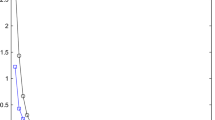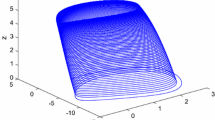Abstract
This paper addresses the problem for output synchronization of a class of complex networks (CNs) with reaction–diffusion terms and input constraint. Without considering input constraint, proportional–spatial derivative (P–sD) control of the CN is firstly studied, and then, the problem of output synchronization of CN is formulated as the feasibility problem of linear matrix inequalities (LMIs). Based on the obtained results, considering P–sD control with input constraint, output synchronization is then studied and formulated as the feasibility problem of LMIs and spatial algebraic linear matrix inequalities (SALMIs). In the end, numerical simulation shows the effectiveness of the proposed methods.





Similar content being viewed by others
Explore related subjects
Discover the latest articles and news from researchers in related subjects, suggested using machine learning.References
Liu H, Zhang R, Liu J, Zhang M (2016) Time synchronization in communication networks based on the Beidou foundation enhancement system. Sci China Technol Sci 59(1):9–15
Fan D, Wang Q (2016) Synchronization and bursting transition of the coupled Hindmarsh-Rose systems with asymmetrical time-delays. Sci China Technol Sci. doi:10.1007/s11431-016-0169-8
Xu W, Cao J, Yu W, Lu J (2014) Leader-following consensus of non-linear multi-agent systems with jointly connected topology. IET Control Theory Appl 8(6):432–440
Xu W, Chen G, Ho DW (2016) A layered event-triggered consensus scheme. Control Theory Technol 14(1):2–10
Reijneveld J, Ponten S, Berendse H, Stam C (2007) The application of graph theoretical analysis to complex networks in the brain. Clin Neurophysiol 118(11):2317–2331
Delgado J (2002) Emergence of social conventions in complex networks. Artif Intell 141(1):171–185
Sporns O (2011) The human connectome: a complex network. Ann New York Acad Sci 1224(1):109–125
Wang J, Wu H (2012) Local and global exponential output synchronization of complex delayed dynamical networks. Nonlinear Dyn 67(1):497–504
Song Q, Cao J (2010) On pinning synchronization of directed and undirected complex dynamical networks. IEEE Trans Circuits Syst I 57(3):672–680
Yu W, Chen G, Lü J (2009) On pinning synchronization of complex dynamical networks. Automatica 45(2):429–435
Rakkiyappan R, Sakthivel N (2015) Pinning sampled-data control for synchronization of complex networks with probabilistic time-varying delays using quadratic convex approach. Neurocomputing 162:26–40
Rakkiyappan R, Kaviarasan B, Rihan F, Lakshmanan S (2015) Synchronization of singular Markovian jumping complex networks with additive time-varying delays via pinning control. J Frankl Inst 352(8):3178–3195
Christofides P (2012) Nonlinear and robust control of PDE systems: methods and applications to transport-reaction processes. Springer, Berlin
Wang J, Wu H, Li H (2012) Distributed proportional–spatial derivative control of nonlinear parabolic systems via fuzzy PDE modeling approach. IEEE Trans Syst Man Cybern Part B Cybern 42:927–938
Yang C, Qiu J, Wang J (2014) Robust \({H}_{\infty }\) control for a class of nonlinear distributed parameter systems via proportional–spatial derivative control approach. Abstr Appl Anal 631071:1–16
Yuan K, Alofi A, Cao J, Al-Mazrooei A (2014) Synchronization of the coupled distributed parameter system with time delay via proportional–spatial derivative control. Discret Dyn Nat Soc 2014(418258):1–7
Yang C, Qiu J, He H (2015) Exponential synchronization for a class of complex spatio-temporal networks with space-varying coefficients. Neurocomputing 151:40–47
Yang C, Qiu J, Yi K, Chen X, Zhang A, Chen X, Yang L (2015) Robust exponential synchronization for a class of master–slave distributed parameter systems with spatially variable coefficients and nonlinear perturbation. Math Probl Eng 380903:1–16
Yang C, Qiu J, Li T, Zhang A, Chen X (2015) Projective exponential synchronization for a class of complex PDDE networks with multiple time delays. Entropy 17(11):7298–7309
Yang T, Saberi A, Stoorvogel A, Grip H (2011) Output consensus for networks of non-identical introspective agents, In: Proceedings of 50th IEEE Conference on Decision and Control and European Control Conference, pp. 1286–1292
Wang Z, Zhang W, Guo Y (2011) Adaptive output consensus tracking of uncertain multi-agent systems, In: Proceedings of American Control Conference, pp. 3387–3392
Wieland P, Sepulchre R, Allgöwer F (2011) An internal model principle is necessary and sufficient for linear output synchronization. Automatica 47(5):1068–1074
Xi J, Shi Z, Zhong Y (2012) Output consensus analysis and design for high-order linear swarm systems: partial stability method. Automatica 48(9):2335–2343
Zhao J, Hill D, Liu T (2010) Passivity-based output synchronization of dynamical networks with non-identical nodes. In: Proceedings of 49th IEEE Conference on Decision and Control, pp. 7351–7356
Chopra N (2012) Output synchronization on strongly connected graphs. IEEE Trans Autom Control 57(11):2896–2901
Shen H, Park J, Wu Z (2014) Finite-time synchronization control for uncertain Markov jump neural networks with input constraints. Nonlinear Dyn 77(4):1709–1720
Wu H, Wang J, Li H (2012) Design of distributed \({H}_{\infty }\) fuzzy controllers with constraint for nonlinear hyperbolic PDE systems. Automatica 48(10):2535–2543
Cheng Z, Zhang H, Fan M, Chen G (2015) Distributed consensus of multi-agent systems with input constraints: a model predictive control approach. IEEE Trans Circuits Syst I 62(3):825–834
Du H, Zhang N (2009) Fuzzy control for nonlinear uncertain electrohydraulic active suspensions with input constraint. IEEE Trans Fuzzy Syst 17(2):343–356
Wang J, Wu H, Li H (2012) Stochastically exponential stability and stabilization of uncertain linear hyperbolic PDE systems with Markov jumping parameters. Automatica 48:569–576
Acknowledgements
This work was supported in part by the National Natural Science Foundation of China under Grant No. 61273012, in part by the Science and Technology Development Plan Project of Shandong Province under Grant No. 2013GGX10601.
Author information
Authors and Affiliations
Corresponding author
Ethics declarations
Conflict of interest
The authors declare that there is no conflict of interests regarding the publication of this article.
Rights and permissions
About this article
Cite this article
Yang, C., Li, X. & Qiu, J. Output synchronization control with input constraint of complex networks with reaction–diffusion terms. Neural Comput & Applic 30, 3295–3302 (2018). https://doi.org/10.1007/s00521-017-2892-0
Received:
Accepted:
Published:
Issue Date:
DOI: https://doi.org/10.1007/s00521-017-2892-0




